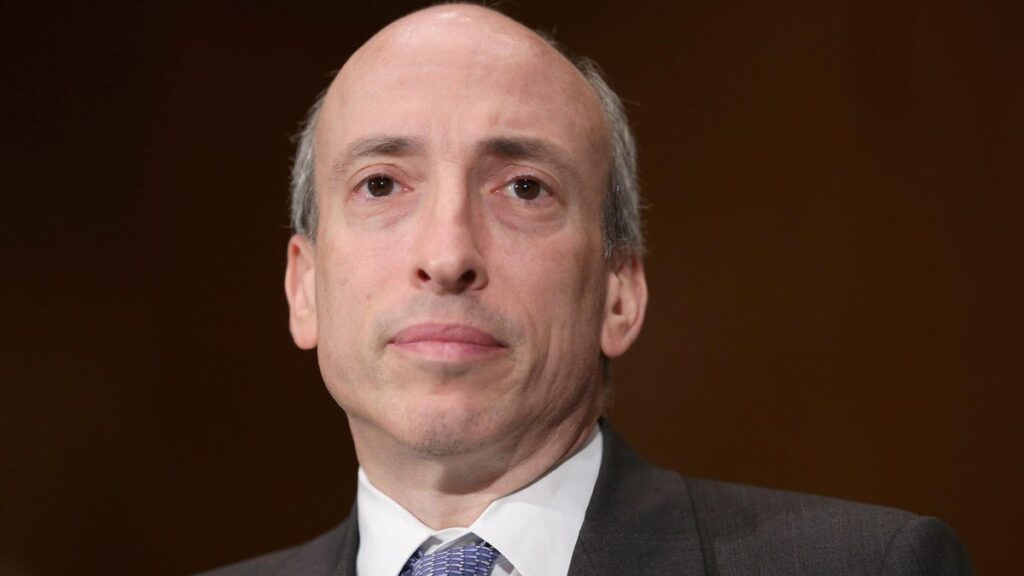Grayscale is currently assessing the potential tax implications linked to spot Bitcoin exchange-traded funds (ETFs) amid the circulation of inaccurate information regarding adverse tax consequences. In a series of posts shared on X (formerly Twitter),
Grayscale aimed to clarify the situation and ensure that retail investors involved with the Grayscale Bitcoin Trust (GBTC) are not expected to face tax-related issues when the fund sells Bitcoin to generate cash for fulfilling share redemptions.
The company is actively working towards obtaining the necessary regulatory approvals to migrate $GBTC to NYSE Arca, and as part of this process, they are considering the potential tax ramifications associated with spot Bitcoin ETFs that may need to sell their Bitcoin holdings to meet share redemption demands.
This discussion has come to the forefront due to the unique structure of GBTC, which is established as a grantor trust.
In a grantor trust, the entity that establishes the trust retains ownership of the assets, in this case, the underlying Bitcoin, for income and tax purposes.
Grayscale emphasized that cash redemptions of grantor trusts do not constitute taxable events for non-redeeming shareholders, such as retail investors.
This sets GBTC apart from mutual funds and many other ETFs, which operate differently for tax purposes. Grayscale’s position is that GBTC should be treated as a grantor trust.
READ MORE: SEC Chair Gary Gensler Hints at Revised Approach to Bitcoin ETFs Following Recent Legal Rulings
This development follows recent reports that the United States Securities and Exchange Commission (SEC) held discussions with Grayscale regarding its spot Bitcoin ETF application.
On December 8, it was reported that Grayscale and Franklin Templeton had met with the SEC to review their applications, closely following a meeting with representatives from Fidelity.
In addition, just a few days prior, on December 5, the SEC decided to postpone its decision on Grayscale’s spot Ether ETF application until January 24, 2024.
This delay underscores the ongoing regulatory scrutiny and evolving landscape surrounding cryptocurrency ETFs.
In conclusion, Grayscale is proactively addressing potential tax implications associated with spot Bitcoin ETFs to provide clarity and reassurance to its investors.
These considerations are taking place within the context of ongoing discussions and regulatory developments surrounding cryptocurrency ETFs in the United States.
Ripple’s Chief Legal Officer, Stuart Alderoty, recently provided insights into the cryptocurrency landscape’s future in 2024.
His discussion encompassed various topics, including Ripple’s legal battle with the United States Securities and Exchange Commission (SEC), the influence of the judiciary on crypto regulations, and potential legislative challenges within the U.S. Congress.
Alderoty first predicted a possible resolution of Ripple’s lawsuit with the SEC in 2024. He expressed concern about the SEC’s persistent “regulation by enforcement” strategy and its potential ramifications for the broader crypto industry.
This strategy has raised questions about regulatory clarity and the impact on cryptocurrency businesses.
Furthermore, Alderoty anticipated that the judiciary would play a significant role in curbing potential SEC overreach.
He suggested that ongoing legal conflicts might escalate to a confrontation in the U.S. Supreme Court, emphasizing the importance of judicial decisions in shaping crypto regulations.
Regarding regulatory matters, Alderoty expected consensus among U.S. lawmakers regarding the necessity of crypto regulations.
However, he also foresaw potential deadlock in implementing these regulations.
Such a stalemate could leave U.S. crypto firms vulnerable while other countries make strides in providing regulatory clarity and fostering innovation within the industry.
In 2020, the SEC filed a lawsuit against Ripple Labs and its current and former CEOs, alleging that they conducted an unregistered initial public offering of XRP, which the SEC considered a security at the time.
The lawsuit contended that Ripple had raised funds by selling XRP tokens in unregistered security offerings to both U.S. and global investors.
READ MORE: Ripple Advocates for Central Bank Digital Currencies in New White Paper
However, in a notable development, Ripple secured a legal victory against the SEC in July, with a judge ruling that XRP was not a security, but only in the context of programmatic sales on digital asset exchanges.
Despite this, the SEC also achieved a victory, as the judge deemed XRP a security when sold to institutional investors, meeting the conditions set in the Howey test.
This ruling led to major U.S. exchanges relisting XRP, resulting in an impressive 83% year-to-date increase in the token’s value.
Critics argue that Ripple’s legal dispute with the SEC has hindered its growth and acceptance in the United States.
Pro-XRP attorney John Deaton asserted that the lawsuit was weaponized, citing evidence from the past three years to support this claim.
Despite Ripple’s global success, Deaton contended that the case had a detrimental effect on XRP adoption within the United States.
In the ongoing legal battle between Coinbase and the United States Securities and Exchange Commission (SEC), John Deaton, a prominent lawyer supporting XRP, has accused SEC Chair Gary Gensler of manipulating public perception and expressed disagreement with his stance on cryptocurrencies.
The conflict arises as the SEC recently rejected Coinbase’s petition for cryptocurrency rulemaking on three grounds.
First, they argued against applying existing securities laws to cryptocurrencies.
Second, they questioned the SEC’s involvement in the crypto securities markets through regulatory measures.
Lastly, they stressed the importance of preserving the SEC’s discretion in setting its rulemaking priorities.
Deaton took to social media, notably X (formerly Twitter), to highlight Gensler’s rationale behind the SEC’s decision.
Gensler asserted that “there is NOTHING unique or new about cryptocurrencies” and suggested that Coinbase’s request was based on the mistaken belief that the crypto ecosystem was distinct in terms of asset volatility and the classification of all assets as securities under current regulations.
John Deaton challenged Gensler’s current position by recalling his earlier testimony before Congress in 2023.
During that testimony, Gensler had acknowledged the uniqueness of cryptocurrencies and their potential to create a regulatory gap, which contradicts his recent stance.
Deaton argued that Coinbase’s rulemaking petition had relied on the SEC’s previous perspective, as evident in prior communications.
READ MORE: Gemini Earn Creditors Face Drastic Payout Reduction in Proposed Reorganization Plan
He attributed Gensler’s apparent reversal on crypto-related matters to political influences and support from Senator Elizabeth Warren.
The SEC’s handling of the cryptocurrency ecosystem has raised questions due to inconsistencies between Gensler’s statements and the commission’s actions.
While they continue to engage in legal disputes with Coinbase and Binance, the SEC chose not to appeal its loss against Grayscale Investments.
This particular case involved Grayscale’s attempt to convert its Grayscale Bitcoin Trust into a spot exchange-traded fund.
In summary, the ongoing legal feud between Coinbase and the SEC has exposed disagreements within the regulatory body regarding cryptocurrencies.
John Deaton’s accusations of gaslighting against SEC Chair Gary Gensler highlight the evolving nature of crypto regulation and the need for clarity and consistency in the SEC’s approach to this rapidly developing industry.
Bitcoin (BTC) faced a tumultuous day in the cryptocurrency market, with its ticker symbol, BTC, declining sharply to $42,882.
This drop of over $1,300, equivalent to 3.2%, occurred on the heels of a brief recovery from recent volatility. Bitcoin struggled to maintain its position above $43,000 as the bulls failed to gain momentum.
The decline in BTC’s price coincided with news that the United States Securities and Exchange Commission (SEC) had rejected a request from major cryptocurrency exchange Coinbase to revise the rules governing crypto.
SEC Chair Gary Gensler expressed his support for the Commission’s decision, emphasizing that existing laws and regulations apply to the cryptocurrency securities market.
He also stressed the importance of maintaining the Commission’s discretion in setting its own rulemaking priorities.
The SEC’s involvement in the crypto market has been closely watched, especially with expectations that it will approve the first U.S. Bitcoin spot price exchange-traded funds (ETFs) in early 2024.
Gensler clarified that the SEC’s actions are based on its authorities and how courts interpret those authorities.
Analyzing the order books, traders noticed an increase in bid support around the $41,000 level, which became a point of interest.
There was also active supply noted around the $44,000 mark, suggesting a key resistance zone.
On the technical side, the four-hour exponential moving averages (EMAs) were once again in play, with the price contesting these levels and the relative strength index (RSI) dipping below 50.
READ MORE: SEC Stands Firm on Cash Redemption Model for Bitcoin ETFs, Invesco and Galaxy Comply
This setup indicated an impending crucial close in the price action.
Zooming out to a broader perspective, Keith Alan, co-founder of trading resource Material Indicators, observed an ongoing struggle to turn a significant weekly level into support.
This challenge centered around the 0.5 Fibonacci retracement line near $42,500, which represented one of the critical hurdles on the path to revisiting the all-time high of $69,000.
Material Indicators also reported that large-volume traders were showing increased buying activity at the time, suggesting that “Mega Whales” were trying to reclaim the $42,000 price level.
This battle between buyers and sellers indicated the potential for further price volatility in the Bitcoin market.
In summary, Bitcoin faced a downward correction below $43,000, influenced by the SEC’s decision regarding Coinbase’s rule request.
The cryptocurrency market remained dynamic, with traders closely monitoring key support and resistance levels, as well as the actions of significant market players.
Kazakhstan’s central bank digital currency (CBDC), the digital tenge, has achieved resounding success after a one-month pilot project.
Significant enhancements in terms of business, regulation, and technology are on the horizon for 2024.
During the pilot phase, the digital tenge was employed to provide free school lunches to children in Almaty, utilizing the local Onay card initially designed for the transit system.
These transactions were facilitated by the Kazpost postal system operator.
Four local banks, in collaboration with Visa and Mastercard, distributed plastic cards to focus group members.
These cards enabled users to make in-person and online purchases while also permitting cash withdrawals from ATMs. Participating merchants were given the choice to accept digital tenge or convert them into “non-cash” tenge.
By opting for the conversion of digital tenge, these funds seamlessly integrated into existing point-of-sale and QR systems, functioning both within and outside Kazakhstan.
This level of interoperability was a groundbreaking achievement in the realm of CBDCs.
READ MORE: SEC Chair Gary Gensler Hints at Revised Approach to Bitcoin ETFs Following Recent Legal Rulings
Further experiments with the digital tenge encompassed cross-border payments via SWIFT, issuance of CBDC-backed stablecoins on the Binance and KASE platforms, tokenization of gold, collection of value-added tax through smart contracts, and the trial of a “move-to-earn” app.
Looking ahead to 2024, the National Bank of Kazakhstan and the National Payment Corporation of Kazakhstan (NPCK), established in September to oversee the national CBDC, have an extensive agenda.
Their objectives include expanding the network of intermediary banks and advancing decentralized finance applications.
Offline transactions on a large scale are a top priority, aiming to boost financial inclusion in regions with limited internet connectivity.
Increased involvement in cross-border payment projects, such as Project mBridge, is also anticipated.
Regulatory and legislative goals are in the pipeline, alongside efforts to enhance the security and processing speed of the digital tenge.
NPCK CEO Binur Zhalenov has underscored in interviews that the digital tenge will not be utilized for user surveillance, addressing privacy concerns.
The successful pilot project and the ambitious plans for 2024 position Kazakhstan’s digital tenge as a promising development in the world of central bank digital currencies.
The United States Securities and Exchange Commission (SEC) has entered into a fresh round of discussions with asset management firms regarding the potential approval of a spot Bitcoin exchange-traded fund (ETF) in the U.S.
These discussions included officials from the office of SEC Chair Gary Gensler, signifying a notable development in the regulatory landscape for cryptocurrency investments.
According to official court filings, on December 14th, the SEC held a meeting with representatives from BlackRock to deliberate over the proposed rule change that would permit the trading of a crypto investment vehicle on major U.S. exchanges.
This marks the third meeting between BlackRock and the SEC, underlining the growing interest and anticipation surrounding this potential approval. ETF analyst Jayme Seyffart from Bloomberg highlighted the significance of these discussions.
In recent weeks, meetings between asset managers and the SEC have intensified. On December 8th, Grayscale and Franklin Templeton also engaged in discussions with regulators regarding their respective ETF applications. Fidelity had a similar meeting a day earlier.
The most recent meeting on December 14th between BlackRock and the SEC, which involved Gensler’s office, underscores the high stakes involved.
In late November, Chair Gensler’s staff met with representatives from Hashdex to address concerns related to market manipulation and investor protection.
Browse the Latest Crypto News Today
Key topics of discussion included the use of cash creations and redemptions, as well as the acquisition of spot Bitcoin from physical exchanges within the Chicago Mercantile Exchange market.
Several prominent asset managers, including WisdomTree, BlackRock, Invesco, Fidelity, and Grayscale, are actively working towards launching spot Bitcoin ETFs.
Historically, the SEC has denied similar proposals, but it now appears to be deferring its next decisions until early January, coinciding with the expiration of most applicants’ latest deadlines.
If approved, a spot Bitcoin ETF would enable Bitcoin to be traded on major Wall Street exchanges, making it accessible to a wider audience of investors backed by some of the world’s most influential investment firms.
Conversely, if denied, investment managers are likely to appeal the decision, further prolonging the wait.
It’s important to note the distinction between spot Bitcoin ETFs and futures Bitcoin ETFs.
The former directly tracks the real-time market price of Bitcoin, holding actual Bitcoin, while the latter invests in Bitcoin futures contracts, which are agreements based on the future price of Bitcoin.
The SEC approved the first futures Bitcoin ETF in 2021, and now the focus has shifted to spot Bitcoin ETFs as the industry eagerly awaits regulatory clarity.
According to a recent report released by cryptocurrency company Paxos, 99% of financial services firms in the United States are placing equal or greater emphasis on cryptocurrency projects in 2023 compared to previous years.
Paxos conducted a survey involving 400 executives from U.S.-based financial services companies with a minimum of five million users and either $50 billion in assets under management or $50 billion in annual payments volume.
The “2023 Enterprise Digital Asset Adoption Report” highlights the growing interest in integrating cryptocurrency technology into traditional financial services.
However, despite this strong interest, these companies are encountering various obstacles and challenges on their crypto journey.
Among those surveyed, 56% identified implementation complexity as the most significant hindrance to launching a cryptocurrency solution.
Paxos emphasized the resilience of digital assets and blockchain technology in the face of market events and economic challenges, noting that companies are increasingly recognizing the long-term value of this technology.
In response to the challenges associated with crypto infrastructure, Jonathan Anastasia, an executive at Mastercard, commented in the report that collaborating with a crypto-native firm proved beneficial. He remarked, “Infrastructure is hard.
We needed to seek out a native player in this space with the deep expertise necessary to guide the companies on this journey.”
Browse the Latest Crypto News Today
The report also revealed that 51% of respondents cited market volatility as a major obstacle to their companies’ progression in the crypto and blockchain space.
Additionally, 43% identified the financial cost of implementation as a significant roadblock.
Surprisingly, despite these challenges, fewer than 2% of the survey participants considered a lack of belief in the benefits of blockchain technology to be an impediment.
This suggests that even though companies acknowledge the hurdles ahead, they remain optimistic about the potential rewards that cryptocurrency and blockchain solutions can bring to the financial industry.
In conclusion, the Paxos report underscores the increasing interest and commitment of U.S.-based financial services companies to cryptocurrency projects in 2023.
While they face substantial challenges such as implementation complexity and market volatility, the prevailing sentiment is one of optimism regarding the long-term value and potential benefits of blockchain technology in reshaping the financial landscape.
First Trust, a prominent financial services firm, has made a notable move in the cryptocurrency space by filing for a Bitcoin (BTC) exchange-traded fund (ETF).
However, this ETF is not the typical spot ETF that tracks the performance of Bitcoin directly. On December 14,
First Trust submitted a Form N1-A filing to the United States Securities and Exchange Commission (SEC) for the launch of the First Trust Bitcoin Buffer ETF.
The primary objective of the First Trust Bitcoin Buffer ETF, as outlined in its prospectus, is to participate in the positive price returns of the Grayscale Bitcoin Trust or another exchange-traded product (ETP) that offers exposure to Bitcoin’s performance.
Unlike a spot Bitcoin ETF, which directly follows Bitcoin’s price movements, a buffer ETF employs options to achieve a predefined investment outcome.
Buffer ETFs, often referred to as “defined-outcome ETFs,” are designed to safeguard investors from losses in the event of market declines.
They accomplish this by setting a limit or buffer on a stock’s growth over a specified period, utilizing options to ensure a particular investment outcome and deliver a targeted level of protection against market downturns.
James Seyffart, an ETF analyst at Bloomberg, commented on the First Trust Bitcoin Buffer ETF, highlighting that such funds protect against a predetermined percentage of downside losses while capping potential gains.
He also anticipated the emergence of other unique strategies offering Bitcoin exposure in the coming weeks.
Browse the Latest Crypto News Today
The First Trust Bitcoin Buffer ETF represents one of the initial filings of its kind with the U.S. SEC.
At the time of writing, there are 139 buffer ETFs actively traded in the U.S. market, with total assets under management totaling $32.54 billion.
Buffer ETFs are available across various asset classes, including equities, commodities, and fixed income.
In recent years, buffer ETFs have gained significant popularity, with industry leader BlackRock introducing its first iShares buffer ETFs in June 2023.
These new products, namely the iShares Large Cap Moderate Buffer ETF (IVVM) and the iShares Large Cap Deep Buffer ETF (IVVB), have shown returns of around 5% and 2%, respectively, since their launch, according to TradingView data.
It’s important to note that despite their protective mechanisms, buffer ETFs do not guarantee complete safeguarding of investments.
Investors should be aware that there is a risk of losing some or all of their capital when investing in these funds.
Both First Trust and BlackRock acknowledge that buffer ETFs may not be suitable for all investors and do not provide principal or non-principal protection, meaning investors could still incur losses up to the entire amount of their investment.
OpenAI has officially opened applications for the second edition of its six-week program tailored for artificial intelligence (AI) startups, known as Converge 2.
This program will see OpenAI invest $1 million into each of the 15 successful participants who are chosen.
Converge 2 is an initiative accessible to individuals worldwide, targeting engineers, designers, researchers, and product builders who are utilizing AI for innovative purposes.
OpenAI’s motivation behind this startup fund is rooted in the belief that robust AI systems have the potential to catalyze groundbreaking startups and usher in a new era of innovation.
The growing ubiquity of AI tools and solutions has garnered substantial support from industry experts and investors, particularly in 2023, where generative AI startups have seen significant funding inflows from various companies and organizations.
In November 2022, OpenAI launched the first phase of its startup fund, designed to bolster aspiring founders and companies focused on developing innovative AI products.
This inaugural phase allocated $1 million in investment to each of the 12 chosen startups selected from a pool of applicants.
OpenAI’s CEO, Sam Altman, announced the Converge 2 program via an official statement.
The organization underscored the program’s significance within the AI landscape, emphasizing its commitment to pushing the boundaries of applied AI across vital domains.
READ MORE: Binance and Former CEO Challenge SEC’s Attempt to Include Guilty Plea in Ongoing Legal Battle
Notably, OpenAI will host the initial and final weeks of the program in San Francisco, with the company covering participants’ travel expenses.
Furthermore, OpenAI is actively encouraging founders from diverse backgrounds to apply, irrespective of their location outside the United States or their experience level.
The company has explicitly stated that prior experience with AI systems is not a mandatory requirement.
The application window for Converge 2 is open from December 13, 2023, through January 26, 2024.
In a related development, Kasikornbank, a private bank in Thailand, has introduced a substantial fund of $100 million, known as KXVC, aimed at investing in AI, Web3, and deep tech startups.
This fund is particularly focused on the Asia-Pacific region.
Meanwhile, French AI startup Mistral AI recently announced a successful fundraising round, securing an impressive $415 million in funding.
This funding round was spearheaded by Andreessen Horowitz, with support from the startup’s original backers, Lightspeed Ventures.
The SafeMoon token, a prominent player in the realm of decentralized finance (DeFi), has endured a dramatic 31% plunge within just five hours.
This abrupt downturn was triggered by the revelation that the company responsible for SafeMoon had submitted a Chapter 7 bankruptcy filing.
On December 14, SafeMoon initiated its bankruptcy process by officially filing for Chapter 7, also known as “liquidation bankruptcy,” with the United States Bankruptcy Court for the District of Utah overseeing the case.
Attorney Mark Rose filed the voluntary petition, and Judge Joel Marker was designated to preside over the proceedings.
A purported letter from the firm’s chief restructuring officer surfaced on Reddit, shedding light on the company’s dire financial straits.
The letter explained that the bankruptcy filing had rendered the company unable to meet its employee payroll obligations, advising employees to file claims in the bankruptcy court for unpaid wages.
This unfortunate development follows closely on the heels of the U.S. Securities and Exchange Commission (SEC) charging SafeMoon, its founder Kyle Nagy, CEO John Karony, and CTO Thomas Smith with violating securities laws. The SEC characterized their actions as part of “a massive fraudulent scheme.”
READ MORE: Wikipedia Co-Founder’s Controversial Bitcoin Comments Spark Debate in Cryptocurrency Community
SafeMoon’s token (SFM) witnessed a sharp decline from $0.000065 on December 14 at 8:24 pm UTC to $0.000045 over a five-hour period following the bankruptcy news, according to CoinGecko.
However, it displayed a brief resurgence, rebounding to $0.000061 within a rapid 10-minute span. Presently, SFM is trading at $0.00005729, reflecting a staggering 98.2% drop from its peak price of $0.0033 on January 5, 2022.
Furthermore, its once-impressive $1 billion market capitalization has dwindled to a mere $34.5 million.
Former SafeMoon supporters have expressed their frustrations on Reddit, accusing the SafeMoon developers of perpetrating a rug-pull scam.
Reddit users lamented their losses and cautioned against holding any hope for SafeMoon’s resurgence.
Santiago Melgarejo, a former nonfungible token analyst and sales specialist for SafeMoon, acknowledged that warning signs were apparent from the beginning, especially when numerous employees were abruptly laid off despite working for a month without receiving their salaries.
It’s worth noting that SafeMoon had previously fallen victim to an exploit in March, resulting in a net loss of $8.9 million.










